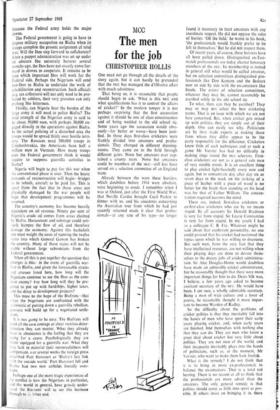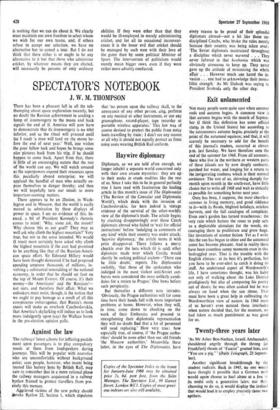The men for the job
MCC CHRISTOPHER HOLLIS
One need not go through all the details of the story again, but it can hardly be pretended that the sicc has managed the d'Oliveira affair with much adroitness.
That being so, it is reasonable that people should begin to ask, 'What is this MCC and what qualifications has it to control the affairs of cricket?' In the modern temper it is not perhaps surprising that the first accusation against it should be one of class consciousness and of being wedded to the old school tie. Some years ago the accusation would obvi- ously—for better or worse—have been justi- fied. In those days first-class cricketers were frankly divided into amateurs and profes- sionals. They changed in different dressing- rooms. They came on to the field through different gates. None but amateurs ever cap- tained a county team. None but amateurs could be members of the mcc—still less have served on a selection committee of an England team.
Already between the wars these barriers, which doubtless before 1914 were absolute, were beginning to erode. I remember when I was at Oxford, just after the First World War, that Neville Cardus brought Cecil Parkin to dinner with us, and his anecdotes concerning the Australian tour from which he had just recently returned made it clear that profes- sionals—at any rate of his type—no longer found it necessary to treat amateurs with any inordinate respect. He did not oppose the rules of barrier. 'Off the field,' he wrote in his book, 'the professionals would frankly prefer to be left to themselves.' But he did not respect them. Of recent years, of course, these barriers have all been pulled down. Distinguished ex-Test- match professionals are today elected honorary members of the MCC. Its membership is indeed in general still what would be called amateur, but on selection committees distinguished pro- fessionals like Don Kenyon and the Bedsers now sit side by side with the ex-amateurs like Insole. The errors of selection committees, whatever they may be, cannot reasonably be ascribed solely to the old school tie.
To what, then, can they be ascribed? They may or may not select the best cricketing teams. That is an issue with which we are not here concerned. But, when cricket gets mixed up with politics, they are simply out of their depth. One can easily see why. Politicians are by their trade experts at making those from whom they differ appear to be the party responsible for the difference. Cricketers
know little of such techniques and at such a game Mr Vorster has had no difficulty in making rings round the MCC selectors. First- class cricketers are not as a general rule men of very nimble minds. It is an excellent thitig to play cricket light-heartedly every now and again, but to concentrate day after day six or seven days in the week on the striking of a piece of leather with a piece of wood is no better for the brain than standing on his head was for that of Father William. The concen- tration required narrows the mind.
There are, indeed, first-class cricketers or ex-first-class cricketers who are by no means stupid. By all accounts Sir Donald Bradman is very far from stupid. Sir Learie Constantine is very far from stupid. In my youth I had as a colleague C. B. Fry. Whatever might be said about that exuberant personality, no one could pretend that his cricket had narrowed the topics upon which he was willing to discourse. But such men, from the very fact that they have intellectual resources, are not willing when their playing days are done to devote them- selves to the dreary jobs of cricket administra- tion. Sir Alec Douglas-Home would doubtless have made an admirable cricket administrator, but he reasonably thought that there were more important things for him to do. Denis Silk was, I believe, a few years ago asked to become assistant secretary of the MCC. He would have been, I am sure, a wholly admirable secretary. Being a man of wide culture and a lover of poetry, he reasonably thought it more impor- tant to become Warden of Radley.
So the difficulty about the problems of cricket politics is that they inevitably fall into the hands of men who have spent their early years playing cricket, and, when early years are finished, find themselves with nothing else that they can do. They are men who know a great deal about cricket but very little about politics. They are not men of the world, and their incapacity inevitably plays into the hands of politicians, such as, at the moment, Mr Vorster, who want to make them look foolish.
What is the remedy? I do not think that it is to bring in more ex-professionals to balance the ex-amateurs. That is a total red herring. There is no reason at all to think that the professionals are more adroit than the amateurs. The only general remedy is that politics should come as little into sport as pos- sible. If others insist on bringing it in, there
is nothing that we can do about it. We clearly must maintain our own freedom to select whom we wish for our own teams, and, if others refuse to accept our selection, we have no alternative but to cancel a tour. But I do not think that there either is or ought to be any alternative to it but that those who administer cricket, by whatever means they are elected, will necessarily be persons of only ordinary abilities. If they were other than that they would be ill-employed in merely administering cricket, and for all its occasional inconveni- ences it is the lesser evil -that cricket should be managed by such men with their love of the game than by some political Minister of Sport. The intervention of politicians would merely mean bigger rows, even if they were rather more adroitly conducted.











































 Previous page
Previous page